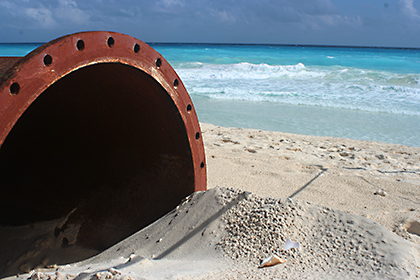A city being flooded with sewage should be a nightmarish situation only realised in unpleasant dreams. In London recently this almost became a reality when a bus-sized, 15 tonne ball of fat almost completely blocked a 2.4 metre diameter sewer pipe. Fortunately, for the residents of Kingston, a sewage worker found, and defeated, the ‘fatberg’ that threatened to turn their streets into a cesspool of flooding sewage.
An extreme but real example many will say couldn’t happen here. Right?
The differences between Sydney and London sewers mean the enormity of scale wouldn’t be replicated, but the same situation could arise with a blockage on private property, or in wastewater mains, that would send sewage surcharges into homes.
The London incident has prompted Sydney Water to advise residents and businesses not to ‘feed a fatberg’.
What is a fatberg?
A fatberg is a mass of congealed, solidified grease and oil found in sewer pipes. Fatbergs start to form on sewer roofs like sewer stalactites which continue to collect and congeal more fat over time until the pipe is completely blocked.
According to sewer workers in London a fatberg is a steaming grease ball that unleashes an imaginable stench. The most recent being detected after residents reported difficulty flushing toilets. It took three weeks to clear using high powered water jets.
Q: What is a fatberg?
A: An expensive sewage disaster to be avoided at all costs.
How to Avoid a Fatberg Sewage Disaster
In the wake of the London fatberg Sydney water has published a reminder to think twice about what goes down your drains.
A blockage on your property can be accompanied not only by sewage overflow but by a hefty plumbing bill. Therefore it is in your interests to avoid pouring fats and oils down your drains.
Is it Just Fats and Oils?
The Sydney Water waste network of pipes extends over 24,000 kilometres. The network serves 4.6 million people. The crews who look after the network do find unusual items including basically anything that can fit.
Fats and oils cause many problems in the network but workers have also found building materials, and more seriously both for the environment and for the health of workers, chemicals, paint and motor oil.
It is essential that anything which can break down or collect on joins is not placed into the waste network because these are things that fats and oils can congeal on.
In the London Fatberg wet wipes have been implicated. Wipes are being flushed, collecting on joins, and then fat is congealing on them. London names the main suspects in sewer crime as wet wipes and fat.
Safe Disposal To Prevent Fatberg
Essential to avoiding fatberg is the safe disposal of fats, oils and other household products.
Here on Sydney’s Northern Beaches, JEDI Plumbing recommends that householders dispose of fats and oils by using absorbent towels, or recyclable containers to collect the fat, which can then be disposed of in the garbage.
Hot food preparation and cooking businesses which produce greasy waste are required to have a trade waste agreement with Sydney Water and must install a grease trap. All waste water from the areas of food preparation and garbage must be connected to the grease trap.
For more dangerous products, like:
*pesticides
*battery acids
*chlorine based cleaning products
*paints,
the Department of Environment and Heritage, in cooperation with local councils, run a free disposal service. Further information about residential or commercial disposal of potentially dangerous waste can be found on the Sydney Water website.
Householders are also cautioned about disposing of wet wipes, nappies, sanitary products, rags or condoms down drains, or in the waste network. These are products that do not break down and can lead to pipe blockages.
The key to preventing fatberg and avoiding a sewage flood is smart waste disposal. Fats and oils make up fatbergs which can block pipes. It is also vital that consumers do not place other waste, which can start the process of pipe blockage, or on which fat can congeal, into the waste network.
As with London, Sydney Water is observing an increase in fats, oils and other waste in the system.
We’re on hand to help our Northern Beaches plumbing clients should they observe the symptoms of drain blockages, and you can contact us here at JEDI Plumbing on 0411 774 381.


